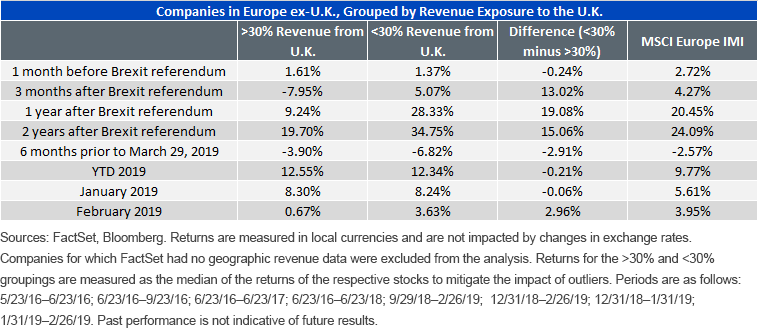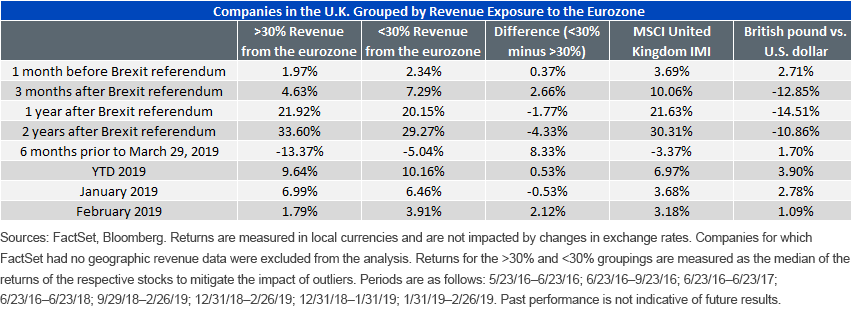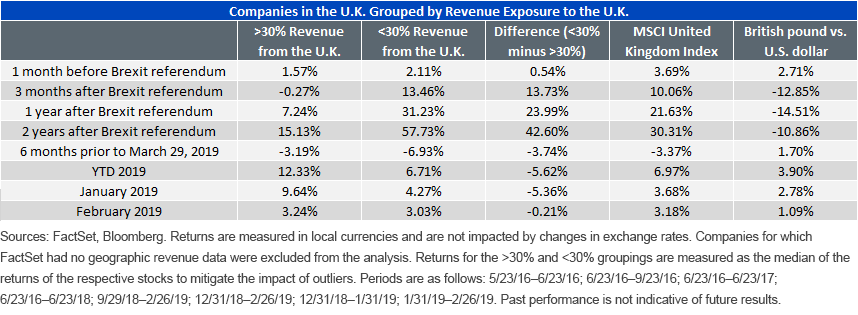Brexit’s Impact for Equity Investors


For someone who moved to the U.K. in the last year, the “Brexit Question” has been important. But it’s also important for U.S. investors. This year there have been dates, potential votes and points when you’d expect to have a more thorough understanding of what Brexit will mean…yet, we are all left staring at each other, still wondering what the outcome might be.
While we may not be able to answer the question as to what Brexit will look like, we can provide greater context for European equity investors.
Question 1: Have European companies outside the U.K. seen their performance impacted thus far by the Brexit process?
Our approach:
- Start with the MSCI Europe Investable Market Index (IMI) universe, excluding U.K. companies.
- Separate the companies into two groups—those that derive more than 30% of their revenue from the U.K., and those that derive less than 30%.
- Compare the median returns of both groups, and note the return of the MSCI Europe IMI for an idea of the market environment during the same periods.
Our conclusions:
- Whether looking at periods of three months, one year or two years after the Brexit vote, there was a significant difference in companies’ median returns based on the amount of revenues received from within the U.K. Over each period, having less revenue from the U.K. led to higher median returns.
- More recently, in 2019, there has been less differentiation in the median returns for the groupings in figure 1, which are based on revenues from within the U.K.
While it’s logical to think that Brexit and the process that we have been undergoing does matter, it may not be the sole factor influencing the returns of these companies. We caution investors against oversimplifying a complex issue based on a single table.
Figure 1: Sensitivity of European Companies to Revenues from the U.K.

Question 2: Have companies in the U.K. that do more business with the eurozone seen returns impacted during the Brexit process?
Our approach:
- Start with the MSCI United Kingdom IMI universe.
- Separate companies into two groups—those that derive more than 30% of their revenue from the eurozone, and those that derive less than 30%.
- Compare the median returns of both groups, and note the return of the MSCI United Kingdom Index IMI for an idea of the market environment during the same periods.
Our conclusions:
- It’s important to consider the behavior of the British pound during this period. For example, the companies that derived greater than 30% of their revenues from the eurozone might be more globally oriented with respect to revenue distribution. This could indicate a potential to perform strongly during periods in which the British pound trends toward depreciation. Notably:
- Three months after the Brexit referendum, the British pound dropped nearly 13%. Companies deriving less revenue from the eurozone outperformed those that derived more revenue from the eurozone.
- One year and two years after the referendum, the U.K. equity market generally performed well, and the companies deriving more revenue from the eurozone performed better than those that derived less revenue from the eurozone. This doesn’t necessarily mean investors were ignoring potential Brexit concerns—we tend to think that the depreciation of the British pound in these periods may have been the bigger factor.
- The differences between returns narrowed in the 2019 period shown. But the median returns in February indicate that companies with less revenue from the eurozone outperformed.
Figure 2: Sensitivity of U.K. Companies to Revenues from the Eurozone

Question 3: If the U.K. economy is perceived to be at risk of slowing down due to the Brexit process, companies that are more domestic in their revenue distributions could be at greater risk. How different were the returns of those companies that derived more revenue from the U.K. compared to those that derived less revenue from the U.K.?
Our approach:
- Start with the MSCI United Kingdom IMI universe.
- Separate companies into two groups—those that derive more than 30% of their revenue from the U.K., and those that derive less than 30%.
- Compare the median returns of both groups, and note the return of the MSCI United Kingdom Index IMI for an idea of the market environment during the same periods.
Our conclusions:
- It’s important to consider the behavior of the British pound during this period. For example, companies that derived less than 30% of their revenues from the U.K. might be more globally oriented with respect to their revenue distribution. This could indicate a potential to perform more strongly during periods in which the British pound trends toward depreciation. The results in figure 3 show three significant periods of British pound depreciation after the Brexit referendum. The median returns of the stocks with less than 30% of revenues from the U.K. outperformed in each of these periods.
- During the periods of British pound strength after the referendum, as seen in figure 3, the most domestically oriented companies in the U.K. saw median returns outperform.
Figure 3: Sensitivity of U.K. Companies to Revenues from the U.K.

Conclusion
While we think these summary statistics are interesting and worth thinking about, they don’t represent the full story of the Brexit impact.
As of this writing, we still don’t know exactly what Brexit will mean. And underlying companies have different cost structures and exposures, which might impact the picture differently once the Brexit situation contains greater and more certain details.
Geographic revenue is an important measure, but we note that it isn’t the sole measure to consider.

Christopher Gannatti began at WisdomTree as a Research Analyst in December 2010, working directly with Jeremy Schwartz, CFA®, Director of Research. In January of 2014, he was promoted to Associate Director of Research where he was responsible to lead different groups of analysts and strategists within the broader Research team at WisdomTree. In February of 2018, Christopher was promoted to Head of Research, Europe, where he was based out of WisdomTree’s London office and was responsible for the full WisdomTree research effort within the European market, as well as supporting the UCITs platform globally. In November 2021, Christopher was promoted to Global Head of Research, now responsible for numerous communications on investment strategy globally, particularly in the thematic equity space. Christopher came to WisdomTree from Lord Abbett, where he worked for four and a half years as a Regional Consultant. He received his MBA in Quantitative Finance, Accounting, and Economics from NYU’s Stern School of Business in 2010, and he received his bachelor’s degree from Colgate University in Economics in 2006. Christopher is a holder of the Chartered Financial Analyst Designation.

